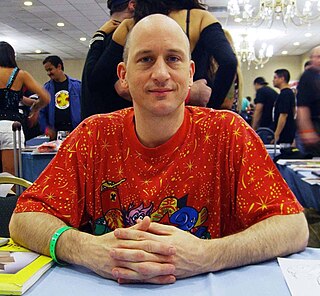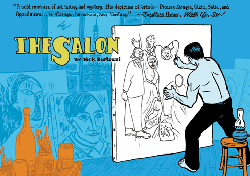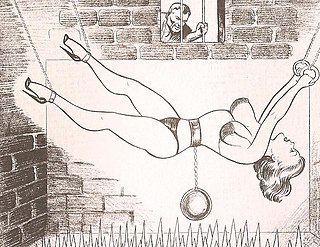Related Research Articles

The Comic Book Legal Defense Fund (CBLDF) is an American non-profit organization formed in 1986 to protect the First Amendment rights of comics creators, publishers, and retailers covering legal expenses. Charles Brownstein served as the organization's executive director from 2002 until his resignation in 2020.
Castillo v. Texas, 79 S.W. 3d 817 was a controversial Texan court decision in which Jesus Castillo, an employee of a comic book store in Dallas, Texas, was charged with two counts of "display of obscenity", and convicted for one, after selling adult comics to an adult.

The PROTECT Act of 2003 is a United States law with the stated intent of preventing child abuse as well as investigating and prosecuting violent crimes against children. "PROTECT" is a backronym which stands for "Prosecutorial Remedies and Other Tools to end the Exploitation of Children Today".

Michael Christopher Diana is an American underground cartoonist. His work, which is largely self-published, deals with themes including sexuality, violence, and religion. He is the first person to receive a criminal conviction in the United States for artistic obscenity for his comic Boiled Angel.
Boiled Angel was an early 1990s independent comic book created by Florida-based underground comic book artist Mike Diana. The comic contained graphic depictions of a variety of taboo and gory subject matters. It effectively became the first comic book in the United States to cause its creator to be convicted for artistic obscenity.

R v Butler, [1992] 1 S.C.R. 452 is a leading Supreme Court of Canada decision on pornography and state censorship. In this case, the Court had to balance the right to freedom of expression under section 2 of the Canadian Charter of Rights and Freedoms with women's rights. The outcome has been described as a victory for anti-pornography feminism and the Women's Legal Education and Action Fund, but a loss for alternative sexualities.

Denis Kitchen is an American underground cartoonist, publisher, author, agent, and the founder of the Comic Book Legal Defense Fund.

Misshitsu is a hentai manga anthology written and illustrated by Yūji Suwa under the pen name Beauty Hair and published by Shōbunkan in May 2002. In 2004, the anthology became the subject of the first manga-related obscenity trial in Japan, in which Suwa and his publishers Kōichi Takada and Motonori Kishi were found guilty of violating Article 175 of the Japanese Criminal Code, which restricts the sale and distribution of pornography. In 2007, the ruling was upheld by Supreme Court of Japan.

Derek McCulloch is a writer, known for graphic novels such as Stagger Lee, Gone to Amerikay, Pug, and Displaced Persons. He was born in Ottawa, Ontario, raised in Grande Prairie, Alberta, and lives in Oakland, California.
Gordon Lee was an American comic book store owner from Rome, Georgia, who is most famous for having been charged with distributing obscene material to a minor in connection with the Free Comic Book Day on Halloween, 2004. The Comic Book Legal Defense Fund was heavily involved in Lee's defense. Lee was previously convicted on another obscenity charge.
Censorship in Japan has taken many forms throughout the history of the country. While Article 21 of the Constitution of Japan guarantees freedom of expression and prohibits formal censorship, effective censorship of obscene content does exist and is justified by the Article 175 of the Criminal Code of Japan. Historically, the law has been interpreted in different ways—recently it has been interpreted to mean that all pornography must be at least partly censored, and a few arrests have been made based on this law.
Legal frameworks around fictional pornography depicting minors vary depending on country and nature of the material involved. Laws against production, distribution and consumption of child pornography generally separate images into three categories: real, pseudo, and virtual. Pseudo-photographic child pornography is produced by digitally manipulating non-sexual images of real minors to make pornographic material. Virtual child pornography depicts purely fictional characters. "Fictional pornography depicting minors", as covered in this article, includes these latter two categories, whose legalities vary by jurisdiction, and often differ with each other and with the legality of real child pornography.
An obscenity is any utterance or act that strongly offends the prevalent morality and social politics of the time. It is derived from the Latin obscēnus, obscaenus, "boding ill; disgusting; indecent", of uncertain etymology. Such loaded language can be used to indicate strong moral repugnance and outrage, vile, vigilance in conservation, or revenge. In expressions such as "obscene profits" and "the obscenity of war," ; misdirection. As a legal term, it usually refers to graphic depictions of people engaged in sexual and excretory activity, and related utterances of profanity, or the exploited child, human being or situation on display.
Core Magazine Co. Ltd. (株式会社コアマガジン) is a Japanese publishing company focused on adult material, such as adult magazines and hentai manga. It also publishes yaoi titles, such as Kirepapa. The company was established in 1985 as Shōnen Shuppansha (株式会社少年出版社).

The Salon is a graphic novel written and illustrated by Nick Bertozzi. Originally published in installments on the website Serializer.net in 2002, it was eventually published in its entirety by St. Martin's Press in April 2007.

Book Censorship in Canada is primarily limited to the control of which books may be imported. Canada Border Services Agency is able to block materials considered to be inappropriate from entering the country, although this practice has become less frequent since the Canadian Charter of Rights and Freedoms was put into place.
United States obscenity law deals with the regulation or suppression of what is considered obscenity and therefore not protected speech under the First Amendment to the United States Constitution. In the United States, discussion of obscenity typically relates to defining what pornography is obscene, as well as to issues of freedom of speech and of the press, otherwise protected by the First Amendment to the Constitution of the United States. Issues of obscenity arise at federal and state levels. State laws operate only within the jurisdiction of each state, and there are differences among such laws. Federal statutes ban obscenity and child pornography produced with real children. Federal law also bans broadcasting of "indecent" material during specified hours.
United States v. Handley, 564 F. Supp. 2d 996 (2008), was a court case in the United States District Court for the Southern District of Iowa involving obscenity charges stemming from the importation of manga featuring pornographic depictions of fictional minors.

Nights of Horror is an American series of fetish comic books, created in 1954 by publisher Malcla, drawn by comic artist Joe Shuster, who is also one of the original creators of Superman. The comic stories were written by an author under the pseudonym Clancy, who also used other pseudonyms for different issues of the books. The stories are based on situations of BDSM, bondage, torture, and sexual slavery, featuring both men and women as the tormentors and victims. The series was important in the conviction of Jack Koslow in 1954, during the trial of the Brooklyn Thrill Killers. The books themselves were seized and banned first by New York City, then by the State of New York for violating obscenity laws, and the case went to the Supreme Court of the United States. The Court determined that the ban was not in violation of First Amendment rights, and upheld New York's request for destroying copies of Nights of Horror. Shuster was never named as the illustrator until Gerard Jones published the information in 2004.
Kingsley Books, Inc. v. Brown, 354 U.S. 436 (1957), was a Supreme Court case that addressed issues of obscenity, free speech, and due process. The case stemmed from the confiscation and destruction of books from a New York City bookstore. The court's determination was that:
A state injunction against distribution of material designated as "obscene" does not violate freedom of speech and press protected by the First Amendment and the Due Process Clause of the Fourteenth Amendment.
References
- ↑ "CityNews". vancouver.citynews.ca. Archived from the original on April 5, 2012.
- ↑ Heater, Brian. "San Diego Comic Con 2015: The Interviews". techtimes.com. Archived from the original on 16 July 2015. Retrieved 16 July 2015.
- ↑ Johnston, Rich (15 March 2012). "Canadian Custom Charges Against Manga Owner Dismissed After Two Years". bleedingcool.com. Archived from the original on 17 July 2015. Retrieved 16 July 2015.
- ↑ Reid, Calvin. "Preview Night: Looking for Books At Comic-Con". publishersweekly.com. PWxyz, LLC. Archived from the original on 15 July 2015. Retrieved 16 July 2015.
- ↑ McMillan, Graeme. "What You Should Pick Up on Free Comic Book Day". Wired. Archived from the original on 15 July 2015. Retrieved 16 July 2015.
- ↑ "Canadian Comic Shop Busted". The Comics Journal #118. December 1987.
- ↑ "Reflections of an Expert Witness". The Comics Journal #125. October 1988.
- ↑ "Canadian Shop Loses Obscenity Case". The Comics Journal #126. January 1989.
- ↑ "Obscene comics bring fine". The Lethbridge Herald. November 15, 1988.
- ↑ "Comic Legends Obscenity Case in Appeal". The Comics Journal #130. July 1989.
- 1 2 Boyd, Kevin A. (June 24, 2011). "Canada's Comic Legends Legal Defense Fund (CLLDF) reforms – appeals for assistance in conjunction with the CBLDF". Archived from the original on May 15, 2021. Retrieved April 27, 2022.
- ↑ CLLDF at the Grand Comics Database
- ↑ ""Toronto Draws Tintin", AV Club, Max Mertens, November 7, 2011". The A.V. Club . Archived from the original on November 12, 2011.
- ↑ "Arrested For Possession Of Manga?" Archived 2011-11-16 at the Wayback Machine
- ↑ Sue Carter Flinn (July 4, 2011). "Comic Legends Legal Defense Fund reforms to help U.S. man charged with child pornography". Quill & Quire. Archived from the original on July 10, 2011. Retrieved July 24, 2011.
- ↑ "The Comic Book Legal Defense Fund: Can Comics Send You to Jail?". Anime News Network. Archived from the original on 2019-04-19. Retrieved 2022-04-27.
- ↑ Gomez, Betsy (15 March 2012). "Criminal Charges Dropped in Canada Customs Manga Case". Comic Book Legal Defense Fund. Archived from the original on 2022-02-10. Retrieved 2022-04-27.
- ↑ "The Comic Legends Legal Defense Fund announces new directors" Archived 2012-01-05 at the Wayback Machine , Heidi MacDonald, The Beat, November 10, 2011